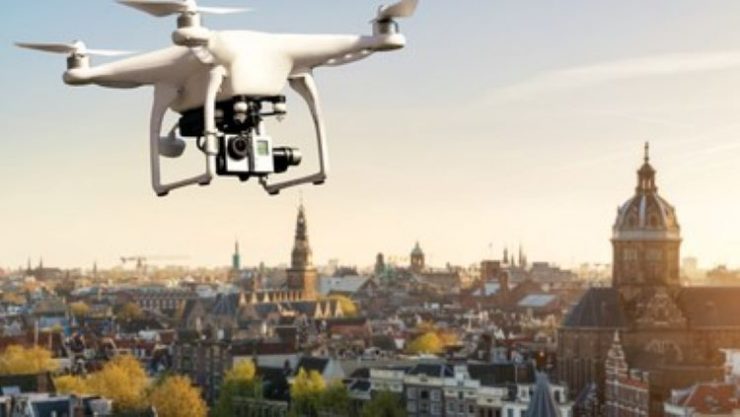Europe has taken another step in developing a commonly agreed concept of operations for UAS traffic management systems across the continent with the completion of the Third Concept of Operations for U Space (CORUS) workshop, hosted by ENAV SpA, in Rome between 2 and 5 April.
CORUS is seeking to build consensus among all stakeholders and collate experiences in drone operations in very low-level airspace. The project’s activity centres on large-scale workshops; these provide CORUS with information, allowing it to build, refine and validate its Concept of Operations for U-Space. It is a Horizon 2020 project, established within the context of SESAR. The project has nine partner organisations: DFS, DLR, DSNA, ENAV, EUROCONTROL (leading), HEMAV, NATS, Unifly and UPC. It is guided by an Advisory Board of 22 members, and a growing ‘U-space Community Network’ of stakeholders. The project also communicates and cooperates with other drone-related projects looking at specific technologies.
Around 200 participants attended the Rome event. Discussing the proposed high-level services architecture (see table below) together with relevant safety-related issues; the societal aspects (including liability, privacy and data protection as well as ethical concerns); and research and development activities required for U-space deployment.
Table one: High level views and draft CORUS concepts
According to a Eurocontrol summary of the event:
“The main goal of the workshop was to ensure that the needs and views of all stakeholders are taken into account in the development of the CORUS Concept of Operations that will encompass all services required for the safe integration of drones in the European airspace. The main workshop conclusions were: unanimous consensus on the fact that solid progress has been made; CORUS has identified some key issues and is on course to produce a useful outcome.”
“The services and the operations identified by CORUS ConOps are defined in a way that shows how they can and should be used together to enable safe drone operations while balancing the needs of the drone sector with those of society as a whole,” observed Andrew Hately, EUROCONTROL’s CORUS Project Technical Coordinator.
In closing the workshop, Luca Bellesia, EUROCONTROL’s CORUS Project Coordinator, remarked: “It is encouraging for us to see the interest raised by CORUS and the wide number of participants contributing to the consolidation of the European U-space ConOps. This workshop has shown that we are moving in the right direction and that there are high expectations on the results of our project.”
Table two: Proposed U-Space services for different classes of airspace
| Airspace X* | Airspace Y | Airspace Z | |
| U-Space service level U1 | |||
| Registration | Mandated | Mandated | Mandated |
| e-identification | Mandated | Mandated | Mandated |
| Geo-awareness | Mandated | Mandated | Mandated |
| U-Space service lebel U2 | |||
| Drone Aeronautical Information Publication | Mandated | Mandated | Mandated |
| Geo-fencing provision | Mandated | Mandated | Mandated |
| Incident / accident reporting | Mandated | Mandated | Mandated |
| Position report submission sub-service | Recommended | Mandated | Mandated |
| Tracking | Offered | Mandated | Mandated |
| Drone operation plan processing | Offered | Mandated | Mandated |
| Emergency management | Offered | Mandated | Mandated |
| Monitoring | Offered | Mandated | Mandated |
| Procedural interface with ATC | Offered | Mandated | Mandated |
| Strategic conflict resolution | No | Mandated | Mandated |
| Traffic information | Offered | Mandated | Offered |
| Weather information | Offered | Offered | Offered |
| Geospatial information service | Offered | Offered | Offered |
| Population density | Offered | Offered | Offered |
| Electromagnetic interference information | Offered | Offered | Offered |
| Navigation coverage information | Offered | Offered | Offered |
| Communication coverage information | Offered | Offered | Offered |
| U-Space Service level U3 | |||
| Collaborative interface with ATC | Offered | Mandated | Mandated |
| Dynamic capacity management | No | Recommended | Mandated |
| Tactical conflict resolution | No | No | Mandated |
*Airspace X
- There are few basic requirements on the operator, the pilot or the drone.
- The pilot remains responsible for collision avoidance.
- VLOS and EVLOS flight are easily possible.
- Other flight modes in X require (significant) risk mitigation.
Airspace Y
- An approved operation plan
- A pilot trained for Y operation
- A remote piloting station connected to U-space
- A drone and remote piloting station capable of position reporting Y airspaces may also have specific technical requirements attached to them
Airspace Z
- An approved operation plan
- A pilot trained for Z operation and/or a compatible, connected automatic drone
- A remote piloting station connected to U-space
- A drone and remote piloting station capable of position reporting




